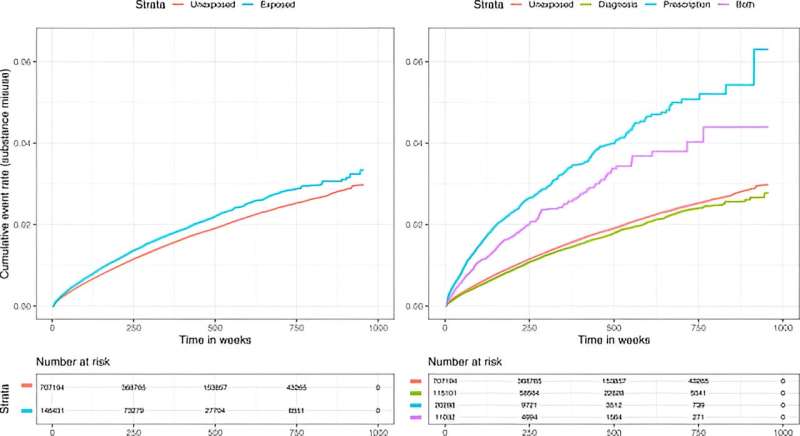This article has been reviewed according to Science X's editorial process and policies. Editors have highlighted the following attributes while ensuring the content's credibility:
fact-checked
trusted source
proofread
Long-term painkiller use in those under 25 may contribute to mental illness and substance misuse

The long-term use of painkillers from a young age may be linked to an increased risk of poor mental health later in life. This is according to research led by scientists at the University of Liverpool and St George's, University of London which is published in The Lancet Regional Health—Europe.
Children and young adults under 25 years of age who have chronic pain were 29% more likely to have a mental illness in adulthood. But those who had chronic pain and were also given a prescription painkiller were 46% more likely to have a mental illness in adult life and had an 82% higher risk of substance misuse.
The researchers also found that having a diagnosis of chronic pain and being prescribed a painkiller at a young age led to more prescription opioid use in later life. They say it is essential to treat chronic pain to protect the health and well-being of those suffering from it, but warn that some of this increased opioid use could feed into the opioid crises, particularly if other treatments may be just as effective.
Critically, the rate of mental illness, substance misuse and prescription opioid use in adulthood was much greater for those who were prescribed painkillers repeatedly to treat their chronic pain, compared to those who did not receive painkillers for their pain.
Chronic pain (defined as pain that lasts more than three months) is common, with 8% of children experiencing intense and frequent pain. Yet most research investigating chronic pain and long-term painkiller use has mainly focused on adults.
Chronic pain and the medicines used to relieve it can both cause long-term harm. Until now, most studies have only looked at one or the other, meaning it is hard to know which causes the most impact. This leaves a major gap in the understanding of how chronic pain and the long-term use of pain medication impacts young people.
Using a database of anonymized electronic health records, researchers investigated health outcomes for 853,625 children and young people aged 2–24 years of age. Of these individuals, 115,101 were diagnosed with chronic pain, 20,298 were given a repeat prescription for painkillers and 11,032 were diagnosed with chronic pain and prescribed painkillers.
They were followed up for an average of five years after the age of 25. In total, 11,644 people were identified as having a substance misuse event, 143,838 were noted as having poor mental health and 77,337 received at least one opioid prescription during follow-up.
Results were adjusted for gender, deprivation, smoking status, alcohol use, BMI, year of birth, prior mental illness and prior substance misuse.
Dr. Andrew Lambarth, Academic Clinical Fellow in Clinical Pharmacology and Therapeutics at St George's, University of London said, "It's clear that chronic pain management in young people needs to be optimized. We know under treating pain can cause harm in both the short- and long-term, but it's also essential to avoid over-reliance on medicines that could lead to dependence on prescription or non-prescription drugs in later life.
"We now need to work with all health care providers to help them weigh-up the risks and benefits of prescribing painkillers at a young age, and encourage the consideration of other recognized and effective non-drug management approaches."
Professor Reecha Sofat, Breckenridge Chair of Clinical Pharmacology and Therapeutics at the University of Liverpool, said, "These trends are concerning as under 25s are particularly vulnerable. This means a regular use of painkillers to ease chronic pain may lead to an unintentional over-reliance on pain medication in adult life. Exploring when the right time is to refer these young people to specialized pain services for more targeted support will also be a vital factor when revamping pain management practice."
The researchers acknowledge that the trends found in the study could be due to a multitude of factors. One reason could be that young people who received painkillers may have had more severe or frequent pain, possibly due to a different cause of pain. They also flag that a tendency to seek-out a prescription of painkillers may be indicative of worse future outcomes.
The team also found that children and young people with intellectual disability and autism spectrum disorder were over-represented among participants receiving repeat prescriptions for pain relief in the absence of a chronic pain diagnosis. They say this may indicate overprescribing in this already vulnerable group.
More information: Andrew Lambarth et al, Prevalence of chronic pain or analgesic use in children and young people and its long-term impact on substance misuse, mental illness, and prescription opioid use: a retrospective longitudinal cohort study, The Lancet Regional Health—Europe (2023). DOI: 10.1016/j.lanepe.2023.100763


















